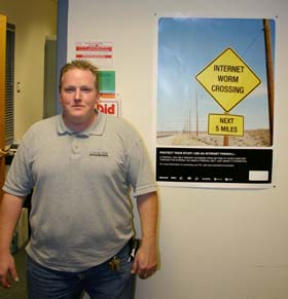Spend some time with the instructors of Clover Park Technical Colleges (CPTC) Computer and Information Systems Security (CISS) department, and you may start to feel like a character in a spy novel.
There’s the story about airplanes flying overhead, scooping confidential and sensitive information from computers and cell phones.
Or the one about a hacker camped out in the parking lot of a business or university; armed with a laptop and a wireless connection, he or she is picking up confidential data such as account numbers and personal records.
The number of ways to compromise a business’s infrastructure is overwhelming and vast. How can legitimate business leaders possibly stay ahead of the crooks?
According to the instructors at Lakewood’s CPTC, the answer is simple: hire a CISS administrator.
“A company gets serious about computer security the first time its server is hit,” says Kelly Hollowell, a CISS instructor. “It wouldn’t be that hard to get into the hearts of financial institutions and start doing damage. But how many companies really think thats going to happen?”
Hollowell and a team of instructors head the leading CISS program in the Western United States. Last May, the college received the esteemed CISS 4011 certification from the National Security Administration (NSA). The honor made CPTC the first college in Washington and Oregon to receive the designation, and the only two-year college in the Western U.S. recognized by the NSA to provide critical cyber-security training.
Six months later, the college received the CISS 4013 certification from the NSA. As such, CPTC became the only college on the West Coast to be recognized with two National Security Agency certifications.
“We’re one of the best kept secrets right now,” says Hollowell. “The college is starting to draw interest from students in Oregon, Utah, Idaho, Eastern Washington, and Montana.”
According to Judy Davis, the college’s Public Information Specialist, the programs roots trace to the colleges course incubator, which is designed to create and develop new curricula. “This was identified as a growing program,” Davis explains. ”The whole idea of this college is to provide training that puts our students into high-paying positions that reflect economic trends. This program is a stellar example of that.”
The 18-month program is designed to prepare students for careers involving the protection of information systems against unauthorized access or modification of information. The program teaches the physical and security skills necessary to detect, document, and counter such threats.
Students start out learning the basics: introductions to workstation, network, telecom, server, and Internet securities; an introduction to data analysis; and Unix and Linux. Courses in workplace ethics, English composition, and Mathematics also promote well-rounded students.
Students then choose among four options for their certification: business continuity and organizational security; computer and communications security; network security, firewalls, and detection systems; and Windows operation systems and security.
“One of the first things we did starting out was send the curriculum to all the industry contacts we knew,” says Hollowell. ”We said, ‘Here’s the curriculum. Tell us what were missing. There were changes that had to be made, and there were areas that were dead-on perfect.”
The team of instructors also brought its background knowledge working in the industry, participating in newsgroups, and staying atop the rapidly changing issues inherent of this industry.
“The incredible part about the program’s success,” adds Hollowell, “is that the instructors unknowingly created a curriculum that complements the NSA’s certification requirements.” When Hollowell and Dan Souza, another instructor, attended an industry conference last spring, they quickly discovered their programs’ value. “We met numerous instructors from major universities and government agencies,” says Hollowell, “and the response was amazing. Professionals approached us from all over the U.S. and asked, ‘How did you come up with this?'”
NSA certification is only one advantage of the CISS program. Another advantage is its flexibility. ”Things change rapidly in this industry,” says Hollowell. ”We are constantly asking, ’Is this class still something that needs to be here? If not, with what can we replace it?’ Our ability to make changes and add classes is easy to do here. Our program reflects the needs of the nation and the industry.”
In addition, according to the instructors, the majority of four-year colleges and universities lack a CISS degree program. “Students can go to a major university for a few years,” adds Hollowell, “and pick, choose, and try to put everything together. But they still lack a CISS degree and certification from the NSA.”
CPTC has also had success placing CISS graduates in jobs at the State of Washington, the Federal government, and private sector industries.
According to the U.S. Department of Labor, the median annual earnings of individuals in these positions in 2002 were $85,240; the top industries were computer systems design and related services, management of companies and enterprises, insurance carriers, depository credit intermediation, and colleges, universities, and professional schools.
”I call our program the ‘cradle-to-grave’ approach,” explains Souza. “We bring a student in with no knowledge of computer and information systems security. When they leave our program, he or she is employable as a security professional.”
For more information, visit Clover Park Technical College online at cptc.edu.










